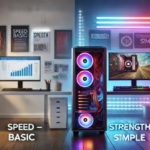In the ever-evolving world of technology, choosing the right processor for your needs can be a daunting task. As we step into 2025, the landscape of processors has become even more sophisticated, with advancements in gaming, editing, and artificial intelligence (AI) tasks pushing the boundaries of what these chips can achieve. Whether you’re a gamer looking to enhance your experience, a content creator seeking seamless editing capabilities, or an AI enthusiast delving into machine learning, selecting the right processor is crucial. This blog post will guide you through the essential considerations for choosing the perfect processor for your needs.
Understanding Processor Basics
Before diving into specific recommendations, it’s important to understand the basics of what a processor does. The processor, or central processing unit (CPU), is often referred to as the brain of the computer. It performs calculations, runs programs, and processes data. Key specifications to consider when evaluating processors include:
• Clock Speed: Measured in gigahertz (GHz), clock speed indicates how fast a processor can execute instructions. Higher clock speeds generally mean better performance.
• Cores and Threads: Cores are individual processing units within the CPU. More cores can enhance multitasking and performance in multi-threaded applications. Threads are virtual cores that help in handling multiple tasks simultaneously.
• Architecture: The architecture, such as ARM or x86, determines the processor’s design and capabilities. It’s essential to choose an architecture that aligns with your computing needs.
Gaming: Power and Performance
For gamers, the processor is a critical component that can significantly impact gaming performance. While graphics cards often steal the spotlight, the CPU plays a vital role in ensuring smooth gameplay and high frame rates.
Key Considerations for Gaming Processors
1. Core and Thread Count: Modern games are becoming more CPU-intensive, with many taking advantage of multiple cores and threads. A processor with at least 6 cores and 12 threads is recommended for gaming editing in 2025.
2. Clock Speed: High clock speeds are beneficial for gaming as they improve the performance of single-threaded tasks, which are common in many games. Aim for a CPU with a base clock speed of at least 4.0 GHz.
3. Cache Size: Larger cache sizes can reduce latency and improve gaming performance. Look for CPUs with a substantial L3 cache.
4. Compatibility with Graphics Cards: Ensure your CPU is not a bottleneck for your chosen graphics card. A balanced configuration will maximize gaming performance.
Top Picks for Gaming
• AMD Ryzen 9 7950X: Known for its high core count and impressive multi-threading capabilities, the Ryzen 9 7950X is a top choice for gamers seeking powerful performance.
• Intel Core i9-13900K: With its high clock speeds and superior single-core performance, the Core i9-13900K is ideal for gaming enthusiasts.
Editing: Creativity Unleashed
Content creators require processors that can handle demanding editing tasks, such as video rendering, photo editing, and 3D modeling. A powerful CPU ensures that your creative processes are smooth and efficient.
Key Considerations for Editing Processors
1. Multi-Core Performance: Editing software often benefits from multiple cores, especially during rendering and encoding tasks. A processor with at least 8 cores is recommended.
2. Integrated Graphics: While dedicated GPUs are preferred for intensive tasks, integrated graphics can be useful for light editing and previewing.
3. Thermal Design Power (TDP): Consider the TDP of the processor, as editing tasks can generate significant heat. Ensure you have adequate cooling solutions.
4. Memory Support: High-speed RAM and sufficient memory channels enhance editing performance. Check the processor’s compatibility with RAM.
Top Picks for Editing
• AMD Ryzen Threadripper 5995WX: With its massive core count and exceptional performance in multi-threaded applications, the Threadripper 5995WX is a powerhouse for editors.
• Intel Core i7-13700K: Offering a balance of performance and affordability, the Core i7-13700K is well-suited for a wide range of editing tasks.
AI Tasks: The Future of Computing
Artificial intelligence tasks, including machine learning and data analysis, require processors that can handle complex computations and large data sets efficiently. As AI continues to transform industries, having the right processor is essential.
Key Considerations for AI Processors
1. Parallel Processing: AI tasks often involve parallel processing, so a high core and thread count is advantageous. Look for processors with at least 10 cores.
2. Support for AI Workloads: Some processors come with specialized AI accelerators or support for AI frameworks that can significantly boost performance.
3. Scalability: Depending on your AI workload, you may need a processor that can scale with your needs. Consider options that allow for upgrades or expansion.
4. Energy Efficiency: AI tasks can be power-intensive. Opt for processors that offer a good balance between performance and energy consumption.
Top Picks for AI Tasks
• AMD EPYC 7763: Known for its scalability and energy efficiency, the EPYC 7763 is ideal for data centers and large-scale AI applications.
• Intel Xeon Platinum 8480+: With its robust performance and support for AI workloads, the Xeon Platinum 8480+ is a reliable choice for enterprise-level AI tasks.
Conclusion
As technology continues to advance, choosing the right processor for gaming, editing, or AI tasks in 2025 requires careful consideration of your specific needs and budget. Whether you’re seeking high frame rates, efficient rendering, or robust AI capabilities, understanding the core specifications and features of processors will guide you to the best choice. Keep in mind that the right processor can significantly enhance your computing experience, paving the way for smoother gameplay, faster editing, and groundbreaking AI innovations.


